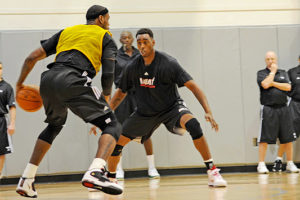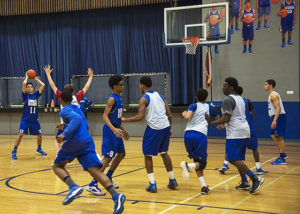Making time for skill development in practice
At the beginning of the season, you have many different things you must implement into your basketball practices, and unless you are fortunate enough to have a core group of returners to your program, you may have to reteach everything. You have to breakdown the defensive principles for your players, teach the new plays that your team is going to use, and go over everything else involved in having a successful season.
In all this confusion, individual player development gets lost and is sometimes completely forgotten. Coaches may tell their players that they need to do skill development on their own, and a few will spend time doing it, but most players will not and the ones that do will most likely lack direction.
Without skill development, your players are not going to be as confident shooting and scoring, and this is going to show in your team’s offensive production.
I was blessed with the opportunity to play Division 1 college basketball at Liberty University (Virginia) and play professionally overseas, so I have been part of many different seasons and coaching styles. In college, I had three different head coaches and coaching staffs. At the time, it was very frustrating going through a new system and learning a different way to do things, but looking back now it was educational. I was able to see three different ways of preparing a team for a new season.
This allowed me to see what worked best, and what didn’t work as well. My goal in this article is to explain why skill development is so important and give you some tips to help work it into your program, while still having enough time for all your other priorities.
Benefits of skill development
If you are like me, you probably want to know the benefits of doing something before you actually undertake it. You don’t want to use valuable practice time with your players if it’s not going to benefit them and ultimately help them win games. So, before I explain how to mix skill development into your practice, I’m going to sell you on why skill development is absolutely necessary to your team and your team’s potential success this year.
The more skilled your players are, the more effective your offense will be. However, that does not mean you need to work on developing 12 pure scorers who are all going to try to take over the game every night. You must develop your players according to their positions and their roles on the team. During the offseason, you should work on developing your players into complete players, but during the season, you need to develop them specifically for their roles within the team.
If you have a big post player whose role on your team is to rebound, screen and play defense, teach them everything they need to know about those skills. Show them how to correctly box out their man before releasing to get the rebound. If you want them to be great at a specific skill, then you better make sure they are practicing that skill on a regular basis. On the flip side, if you have a player who’s a catch-and-shoot scorer, you need to work on their ability to shoot or score points.
 During my sophomore and junior years of college, my role was to be a shooter and space the floor. My coaches geared my skill development to help me become the best shooter possible, and it worked because I shot greater than 42 percent both years and hit more than 100 3-pointers during my junior season. The reason I became a better shooter was because I worked on shot preparation, footwork and follow through on a regular basis. I worked on all the skills that I needed specifically for my role on the team.
During my sophomore and junior years of college, my role was to be a shooter and space the floor. My coaches geared my skill development to help me become the best shooter possible, and it worked because I shot greater than 42 percent both years and hit more than 100 3-pointers during my junior season. The reason I became a better shooter was because I worked on shot preparation, footwork and follow through on a regular basis. I worked on all the skills that I needed specifically for my role on the team.
It doesn’t matter how great your offensive sets are if your team can’t end the possession by putting the ball in the basket. Without skill development, your players are not going to be as confident shooting and scoring, and this is going to show in your team’s offensive production. Making shots solves a lot of problems.
Another reason why you should drill skill development on a regular basis is because you owe it to your players who are trying to play at the next level. I can’t tell you how many high school or college athletes who I watched play and never got any better during their careers. Their skill sets stay the same throughout their four years of play. They might improve a bit and understand the game better, but they never get rid of their weaknesses and master a specific skill set. This might be more geared toward the offseason, but it’s important that they develop their skills during the season too.
One thing I always tried to do was to make sure I was working on an area of my game while steadily becoming a better player. I went from a walk-on that played about five games my freshman year to being ranked the 19th best shooter in the country my senior year. A big reason was because my coaches took the time to help me develop my game on a regular basis.
Skill development also helps break up the monotony of practice. Younger players can only stay mentally locked in for so long before they lose interest and tune out what the coach is saying. To keep this from happening, you should mix in skill development. Do a team shooting drill for 10 minutes between talking about defensive strategies and you can keep players more engaged. This helps them retain more of what you’re talking about.
Mixing in skill development
You might still think to yourself, “I know that skill development is good, but there just isn’t enough time in practice to get everything done while focusing on skill development.” Here are a few ways that you can mix skill development into what you’re already doing in practice and not use any more precious time.
 Before any high-intensity practice your team should warm up, so use a drill to get your players ready. Start with a ball handling drill up and down the floor to work on your players’ handles and get them ready before stretching. One of the things that we did in college was have two or three players shooting while everyone else stretched. We would then rotate players between stretching and shooting. This is a great way to get some quality shots for your players.
Before any high-intensity practice your team should warm up, so use a drill to get your players ready. Start with a ball handling drill up and down the floor to work on your players’ handles and get them ready before stretching. One of the things that we did in college was have two or three players shooting while everyone else stretched. We would then rotate players between stretching and shooting. This is a great way to get some quality shots for your players.
Another way is to use the skill development drills to work on conditioning and competition. Both of these things are key in any basketball team’s success. You’ve likely already made room for these two areas in your practice, so you’re not losing any time to drills. Do a drill that requires players to sprint the floor to work on shooting and conditioning , or do a 1-on-1 drill that teaches players to compete while working on their defensive and offensive moves. There are even drills that you can do for your non-scorers, like rebounding the ball, passing and sprinting the floor. Maximize your time by doubling up what you’re working on.
One of the best ways to work on specific skills for your players is to breakdown game situations and use them for skill development. For example, if your offense uses a lot of pin-down screens, have your big men practice setting screens for your guards. Then have your guards practice using the screens for a shot. That way, you’re working on your offense and helping the players develop their skills. This type of skill development will have a huge payoff down the road.
When you do this, you need to make sure that you explain to the players what’s happening. Teach them why they need to set up their defender before using the pin-down screen and why they need to get squared up before taking a shot. If the players understand the benefits of it, they’ll be much more likely to actually do it in a game. This is mental training, and it helps them become better students of the game.
It may take a little longer at first, but down the road when your players know how to read a defender playing them on the high side of a ball screen, and they slip for a layup, it will be worth it. Your players need to know how to think the game, and it’s your responsibility to teach them how to do that.
Long-term payoff
Hopefully, after reading this article, you see the benefits of making time for skill development and how to implement it into your practices on a regular basis. At first, it may seem that you have more important things to work on, but you need to trust that skill development will payoff in the long run.
You must take the extra time at the beginning to make sure that the foundation of your program is strong and well supported. This is what you’re doing with individual skill development. You may not see the payoff right away, but when all is said and done, your program will be in much better shape than it had been.









